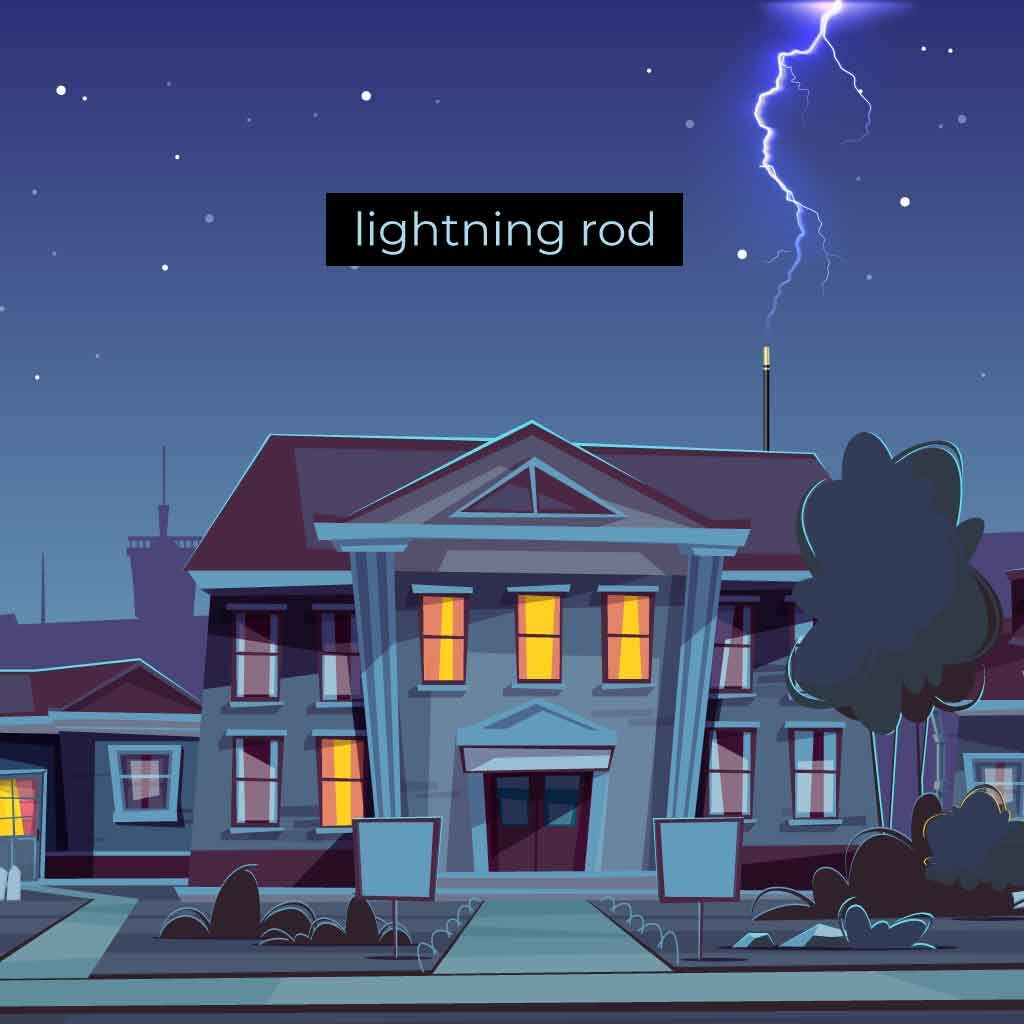
GRE Newsletter Subscribe
Enter your email address below and subscribe to our newsletter

Enter your email address below and subscribe to our newsletter

Hello folks, welcome to the 20th GRE Words List Blog. This series of blogs aims to provide GRE Vocabulary practice in the form of a comprehensive GRE Words List to bolster your GRE Preparation.
For our 10th blog, we put up 10 marquee GRE words for your reading pleasure. However, this blog will not contain 20 GRE words; just the standard 5. If you’d like to check the 10th GRE Verbal Preparation blog out, click here.
Quite like the proverbial bolt from the blue, the idea for this blog’s theme came together from nowhere. You could say, inspiration (thunder)struck me! The GRE words for this blog are ‘galvanize, live wire, lightning rod, insulate, and pull the plug.‘
The phrase ‘bolt from the blue’ was first used in the early to mid-1800s. When skies are blue, there are few to no clouds in the sky, and one would expect a pleasant and sunny day. So, the appearance of a lightning bolt would be unexpected, sudden and well, shocking. That’s why the phrase is now used to refer to events or occurrences that are highly unexpected or sudden.
Part of Speech – verb
Definition –
1. shock or excite (someone) into taking action.
2. coat (iron or steel) with a protective layer of zinc.
Word Origins – early 19th century (in the sense ‘stimulate by electricity’): from French galvaniser.
Synonyms – impel, jolt, invigorate.
Usage – His perfect GRE score of 340 galvanized him into applying to some of the best graduate programs.
Luigi Galvani was an Italian physicist who discovered animal electricity and was a pioneer of bioelectromagnetics. He discovered that dead frogs’ legs twitch when struck by an electric spark. He was of the belief that frogs’ pelvises contained muscles that let them conduct electricity.
His then adversary, Alessandro Volta was of the opinion that the metals used in conducting the above experiment were the reason for the electricity being conducted. As a result, he termed animal electricity Galvanism and set out to disprove it, in the efforts of doing which, he was inspired to create the voltaic pile, later, cell.
Edison-Tesla aren’t the only ones who had electric beef with each other, eh?
Part of Speech – phrase
Definition –
1. a person or thing that attracts criticism, especially in order to divert attention from more serious issues or allow a more important public figure to appear blameless.
2. a metal rod or wire fixed to an exposed part of a building or other tall structure to divert lightning harmlessly into the ground.
Word Origins – early 19th century, primarily an American idiom; turn of phrase that comes from the rod’s act of letting the building go unharmed when lightning strikes.
Synonyms – scapegoat, patsy, fall guy, whipping boy.
Usage – The President’s chief of staff was offered up as a lightning rod to answer for the failures of the administration.

The GRE words, scapegoat and patsy, have very interesting origins.
In the Bible, a scapegoat is one of two kid goats. Practitioners sacrifice one goat, tell the other all the sins of the community and release it into the wilderness, so that it may symbolically take away all their sins and purge them of their evildoing.
The goat that ‘escapes’ however, doesn’t have a great fate. In the wilderness, it can’t fend for itself and soon perishes, along with the secrets and sins it carried.
Patsy was originally used as a diminutive (short form of a name) for Patricia. It was also used as a nickname for people named Martha/Matilda. (What’s in a name?) Notable Marthas called ‘Patsy’ include Martha Washington, George Washington’s wife, but unfortunately do not include either of Batman’s or Superman’s mothers.
A late 1800s vaudevillian – form of comedic and theatrical entertainment – Billy B Van, wrote a sketch that frequently featured the line, ‘Who did that?’ with the response always blaming Patsy Bolivar, a character. From then on, Patsy was used as a byword for anyone who was to be blamed or held responsible, especially if they were innocent and/or ignorant of the crime.
Lee Harvey Oswald, Kennedy’s assassin famously called himself a patsy, set up by the Secret Service, allegedly because he lived in the Soviet Union briefly.
Sure, Lee… Not!
Benjamin Franklin is one of the most versatile, accomplished people to ever live. If you were ever going up for a job against him, you’d better give up. His resume, now Wikipedia page, barely does justice to his exploits.
One of his ~100 achievements is the invention of the lightning rod. We’ve all heard about the story where he, accompanied by a kite and a key, attempts to prove that lightning is in fact, electricity. As a result of his experiments, he grew familiar with the science of lightning and proposed the making of a lightning rod. He said, “…upright Rods of Iron, made sharp as a Needle and gilt to prevent Rusting, and from the Foot of those Rods a Wire down the outside of the Building into the Ground; … Would not these pointed Rods probably draw the Electrical Fire silently out of a Cloud before it came nigh enough to strike, and thereby secure us from that most sudden and terrible Mischief!”
After a series of experiments performed on his own house, wider acceptance for the usefulness and the importance of lightning rods grew.
Fun Fact: Benjamin Franklin is the only man on US currency notes, who has not also been a President.
There are some achievements that eluded even this man!
Part of Speech – phrase
Definition – an energetic and unpredictable person.
Word Origins – late 19th century from the literal ‘live wire’, with current running through.
Synonyms – vivacious, fireball, eager beaver.
Usage – Her live wire personality is what kept the party going.
Part of Speech – verb
Definition –
1. protect (someone or something) from unpleasant influences or experiences.
2. prevent the passage of electricity to or from (something) by covering it in non-conducting material.
Word Origins – From Late Latin insulatus (“made like an island”), past participle of insulare (“to make like an island”), from insula (“island”)
Synonyms – safeguard, cocoon, cloister.
Usage – Every mother strives to insulate her children from harm.
A peninsula! 😬
Two GRE words stem from the same root word, ‘insula’ – insulate and insular.
Insular means ‘ignorant of or uninterested in cultures, ideas, or peoples outside one’s own experience.’ Early usage of this word derives from the fact that people living on islands would have no idea of the outside world, and so would be ignorant of other cultures and ideas, etc.
After transport, infrastructure began to steadily help bridge the gap, insular has also taken on the modern meaning of someone who is willfully ignorant or uninterested of/in other cultures.
Life imitates art, art imitates life. This is a phrase you may have previously seen in our blogs.
Pokemon, the global cartoon monster phenomenon often tends to cleverly incorporate words and their contextual meanings into Pokemon names and features.
Cloister, one of the synonyms of ‘insulate,’ has been modified to Cloyster, a shellfish Pokemon, that is so reclusive, and sheltered, it has several layers of hard shell and spikes to protect itself.
For more wonderful visualizations of GRE words in the Pokemon world, visit Bulbapedia.
Gotta catch ’em all!
Part of Speech – phrase
Definition – prevent something from happening or continuing.
Word Origins – early 17th century: from Middle Dutch and Middle Low German plugge.
Synonyms – abort, terminate, discontinue.
Usage – The government pulled the plug on the infrastructure project because of heavy losses.

A patient is put on life support when one or more of their organs are unable to function as intended.
Doctors tell the patient’s kin to stop life support if they conclude that the patient will not benefit from a transplant, or that the patient would be unable to live much longer. This is because the life support equipment and processes are expensive, and only delay the inevitable for a short time.
Although movies and TV shows dramatize the process of stopping life support, and reduce it to a simple flick of a switch, referring to the electrical plug, the actual medical sense is different.
Pulling the plug, in medical parlance, refers to the removal of the IV fluids and tubes from the patient’s body, and taking them off the ventilator.
What a cheery way to end the blog. Don’t you agree?
(Don’t worry, we’ll be back with more GRE Words List blogs).
If you’re stuck in a rut with your GRE Preparation, don’t pull the plug on it just yet!
Check out Wizako’s Online GRE Quant course and equip yourself to get a great score on the GRE.
We at Wizako have launched our Application Assistance services, and are eager to work with MBA & Graduate School Aspirants who are looking to study abroad. Write to us at [email protected] to get a free profile evaluation, and for more information on our services.
Check us out on our Social Media Handles!
[…] out a section about ol’ Ben Franks here in the GRE Word List Blog […]